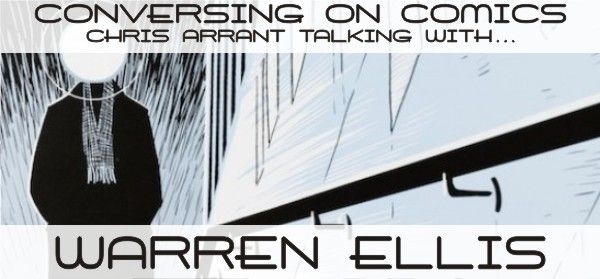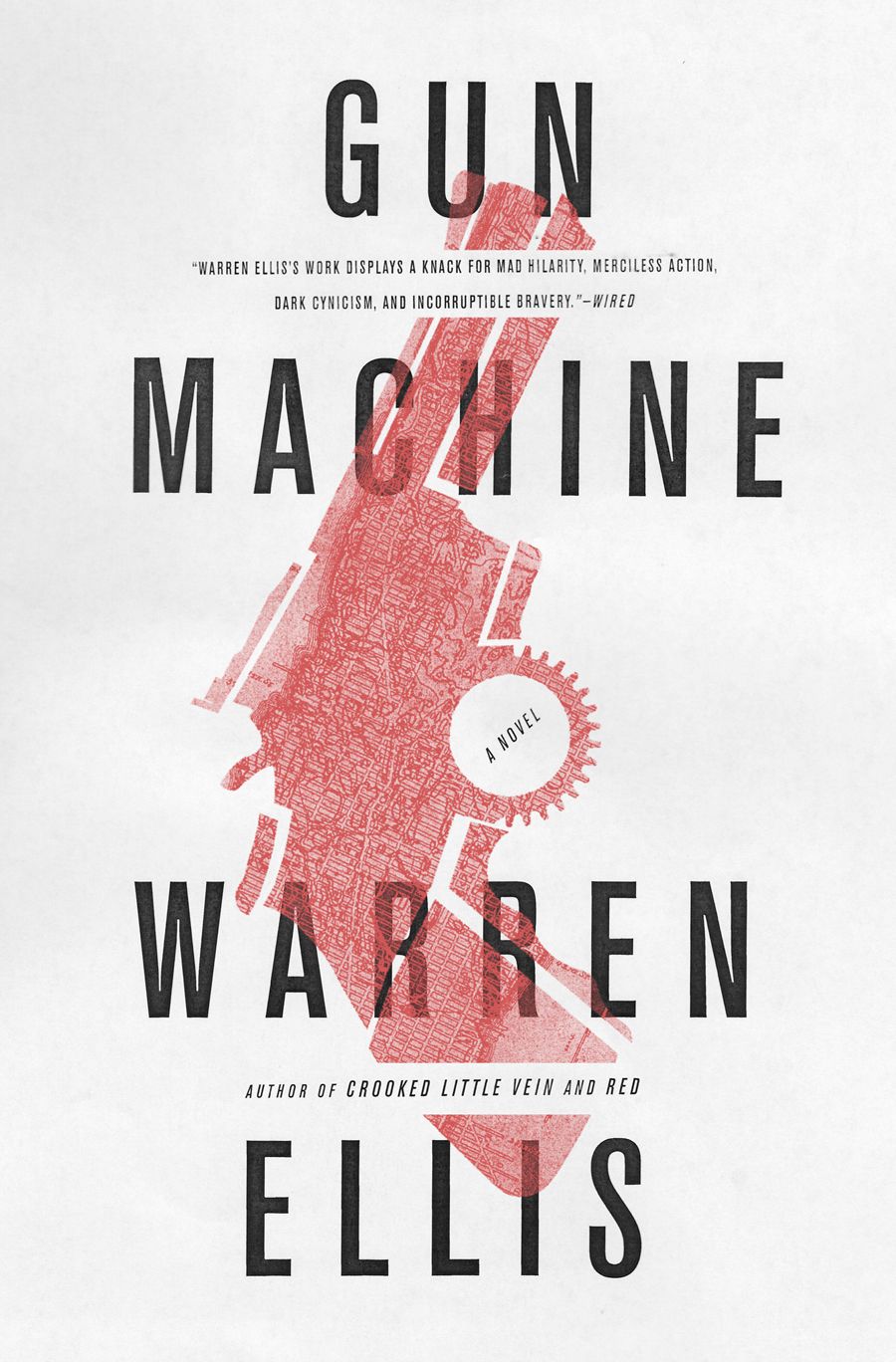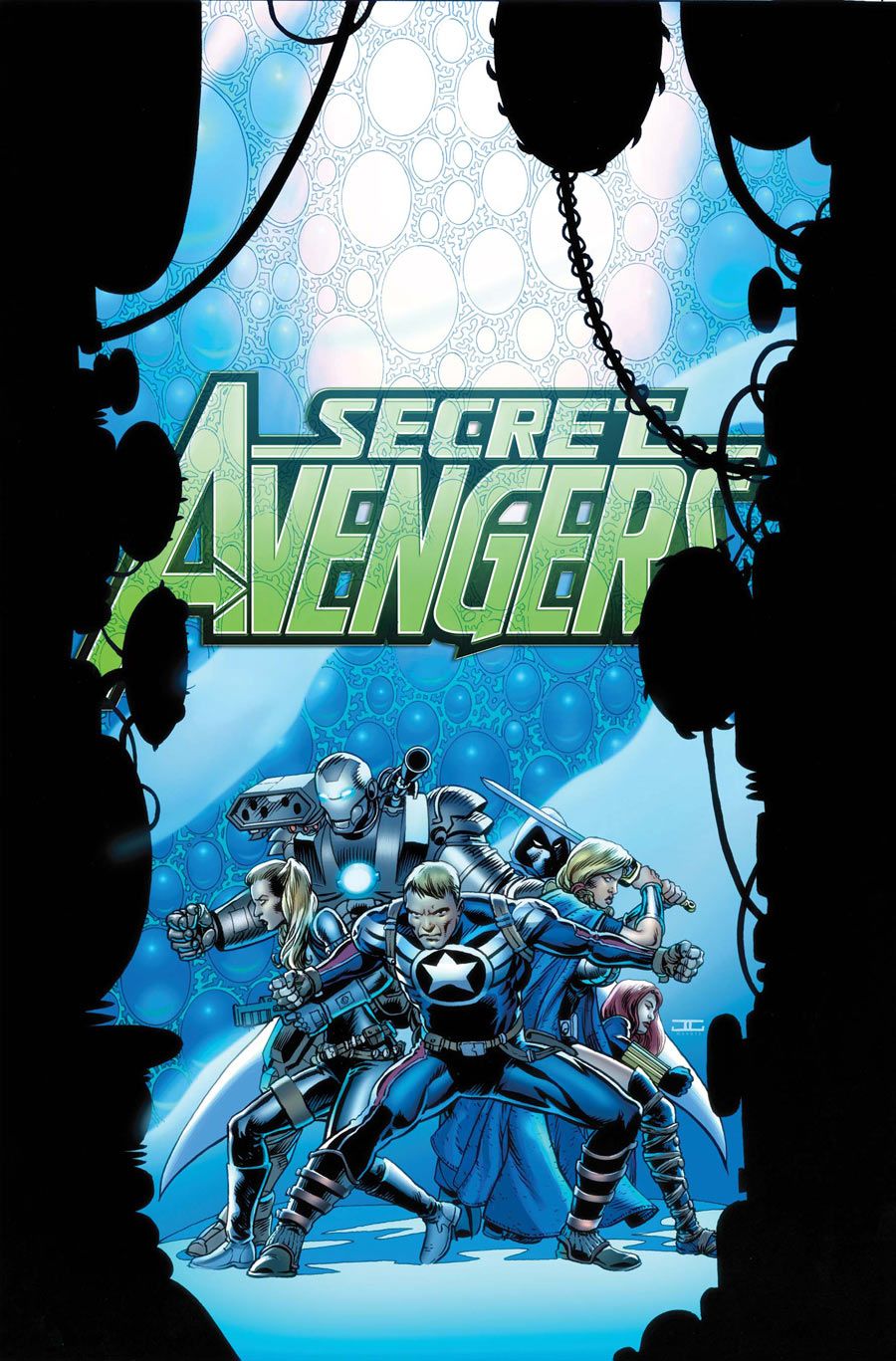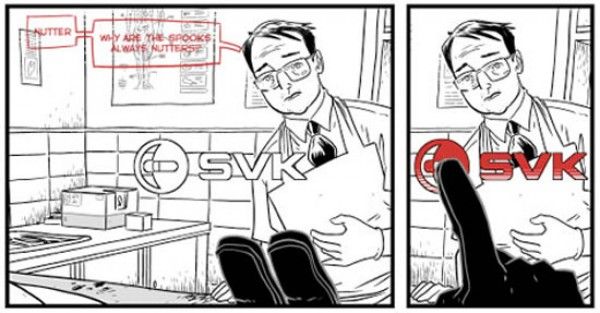One of the strongest voices in comics over the past 20 years has been Warren Ellis, a write whose impressive body of work ranges from Next Wave: Agents of H.A.T.E. and Transmetropolitan to Global Frequency and Planetary to Fell and FreakAngels. In 2012, however, that voice was largely absent from the medium. For the past few years, Ellis has split his time at his time between writing comics and, increasingly, prose novels such as 2008's Crooked Little Vein and commentating on society and culture for magazines like Wired and Vice. On Tuesday, Ellis' second prose novel Gun Machine was released by Mulholland Books, combining his fascination with the layered history of cities with crime noir. I reached out to Warren on Tuesday and we corresponded by email to discuss the future of his career, of comics, and his place in it all.
Chris Arrant: Can you say what you’re working on today?
Warren Ellis: It's January the first, 2013, and I'm not working at all, aside from responding to this, trading some email with my literary agent (Gun Machine went live today) and thinking about my next couple of columns for Vice, as I need to deliver one by Friday.
We’re beginning this conversation at the very beginning of the new year. 2012 was a very strange year for comics, and a transitional year for you from my vantage point. How do you view your writing work done in 2012, not just comics but in prose with Gun Machine and elsewhere?
This year feels like it was doing the research and thinking for the book I'm writing now, and the book I'm writing after it. I'm not even sure I wrote any comics in 2012. A couple of issues of Secret Avengers, maybe? We did a couple of runs at Wastelanders, in between Mr. [Joss] Whedon being carried around the world in a sedan chair made of soft golden boobs and I was going to take that joke a little bit further but I actually made myself feel quite ill. I consulted on the Gun Machine TV pilot with my chosen writer/showrunner, Dario Scardapane. I've written about a dozen columns for Vice UK online and a big feature for Vice magazine.
Did I do anything else? I don't remember. It's January 1, for God's sake. I did a fire walk last night. Five times. Give me a break.
2013, Gun Machine is officially out. I know you’ve got a third novel in the works but comics don’t seem to be too far from your mind. What do you want to accomplish this year?
Getting the third novel out, and then getting the non-fiction book out after that. Which brings me to July, roughly. After that, I look forward to accomplishing sleep.
What is your work schedule like when you’re on deadline as opposed to not being under a looming deadline?
Oh, I spend the same amount of time at the keyboard as I always did. I just don't have to watch the clock for weekly or daily deadlines any more. It's nice, frankly. I was having to hit daily page quotas for a very, very long time, and it got miserable. Which makes it sound like I was breaking rocks for a living, I know. But seven-days-a-week daily deadlines eventually burned me out pretty badly.
With your transition to writing more long-form work, in this case prose novels, I imagine it’s a bit different having such a long gap between releases. I remember Becky Cloonan saying one time that being “away” from comic racks while working on a graphic novel for almost a year was difficult getting used to. Are you feeling any of that having such long cycles between book releases, as opposed to when you were putting out multiple comic books a month, several years ago?
Basically, you disappear from view and memory, and you have to get used to that. The novel after Gun Machine won't be out until the summer of 2014 -- like Gun Machine, a full year after the final draft gets approved -- and, yes, it's weird. I do miss serial storytelling. Weirdly (because I was exhausted and glad to see the back of the bugger), what I miss most is the FreakAngels mode. Online, weekly, free. It was as close as I've gotten to the 2000AD production style, and also, in my head, to a television series. One that went on weekly for three years, sure. But the term I always used for it was "free-to-air," because, in my head, that's what it was all about. Being able to broadcast a comic just after noon every Friday completely free for three years and change. It was a real struggle to do at times, but it was a lot of fun, and felt right.
Going down that comics road, the industry’s seen a lot of shifts these past few years – with an even greater number of potential changes in distribution, printing and creative endeavors looming. What do you think of the comic industry as it sits right now?
I have to be honest with you, Chris: I really haven't paid a lot of attention to it. Every now and then I'll skim a couple of news sites and get a kind of top-slice of what's happening, but that's about it.
Having this more limited view can arguably given you a different perspective on comics. Without digging into minutiae, what’s popping up and about in comics that interests you from what you can see? Creators, stories, formats, trends?
Nope, I've got nothing. I'm barely reading any comics, and none of them regularly. I'm trying to force myself to read more books this year, because last year was largely about assimilating massive amounts of research material. There wasn't a lot of room for reading much of anything else. It felt like a holiday to read Seth Grahame-Smith's new book in four days in order to write a review of it for New Humanist magazine.
Something I wanted to ask you about is your thoughts on how the digital distribution of comics has, surprisingly enough, strengthened the format of the single-issue comic over longer-form works like graphic novels. What are your thoughts on digital comics and the way they’re served and read?
I'd be happier, I think, if the walled-garden services advertised their wares as "rentals." Because if comiXology went away tomorrow, I wouldn't have a clue how to prise my comics out of my iPad app, and I imagine many people may agree. Don't get me wrong, I think comiXology is a good service, and I have no wish to single them out. But "rental for life of service" or some similar language would seem to me to be a clearer statement of the situation.
I really thought I'd see a big surge of people going into digital-first comics -- I probably would have given it a shot myself if I still knew any artists -- and remain kind of surprised that that hasn't happened.
Although not quite digital-first, related to this conversation somewhat to me seems to be the rise of using services like Kickstarter and Indiegogo for fundraising in advance of publishing comics. Do you have any thoughts on this crowd-funding method to get around the relatively low- to non-existent money for advances for authors in comics?
I tend to think of that kind of thing as simply pre-ordering, and also that when it's approached as pre-ordering it probably works best. I've seen people launch Kickstarters that are essentially "you pay for my life while I write/draw this book and then you can go to the shop and buy it and your name will be in the back probably." They mostly crash and burn, but they remain pretty stupid. I like the ones that are all about putting a book in people's hands.
You’ve mentioned here and elsewhere that one of the main hurdles to you doing more comics currently is finding the right artist to collaborate with and the time for both of you to do it. I remember you always having a bushel full of story ideas going back to WEF to now; are there stories in your head or on your computer that you’d tell in comics if the right doors opened up to do them?
There's several things I'd like to try, yes.
Creator-owned comics, especially under the Image banner, seemed to experience a real resurgence between Saga, Jonathan Hickman’s books and The Walking Dead. Do you think the comics industry as a whole is more welcoming of creator-owned work than in the past?
I doubt it. Creator-ownership isn't a thing the marketplace responds to. If Steve Niles and Jimmy Palmiotti had called their anthology anything but Creator-Owned Heroes, it'd probably still be running. I loved the idea of that book, but the title just sounded like the comics version of organic granola. Neither the majority of the audience nor the comics stores give a shit about creators owning their work, I've found. What the audience responds to, still -- the retail community tends to be a little further behind the curve, due not least to the nature of the direct market's mechanism -- are new ideas, done well.
I mean, it's entirely possible that what you're seeing is in fact just the reaction to one of those cycles where the mainstream-comics audience realises that line-wide refreshes at Marvel and DC are not always the same thing as "new ideas," and go in search of fresh wineskins.
The comics industry has fostered a unique kind of community between online venues, comic conventions and the inner workings of publishers. Now that you’re well into your career as a prose novelist, how is that industry and its microcosm working for you?
I am certainly not "well into" a career as a novelist. I've heard that there are communities, venues, mailing lists and other people who talk to people in publishing. But I understand those exist in comics, too, and I never got invited to any of those, either. I just sit in a small room and write stories, Chris, and once a year I leave the house to do a talk somewhere. It's business as usual. You might, in fact, be surprised at the lack of differences between the two industries. No, I won't go into details. Hahaha.
You’ve got a non-fiction book on the horizon from FSG due in 2014 going by the working title of Spirit Tracks. I’ve read your commentary columns collected, but this I presume is something far different. Can you talk about this at all?
This is based on a talk I gave at a digital-cities conference in Berlin the other year: a thing about the past and the future of the city. The talk included ghost hunters, obscure execution devices, UFOs, fun with electromagnetism and brains being boiled in their shells. And so the book will probably have those things too. Only more of them.
I’ve always known you to have keen sense of possible futures, from writing about it in comics to speculating about the future of the comic industry, other industries, and now out here to the future of cities. When you look at cities, what do you see?
Without actually writing the book here: many things. I mean, many early cities were devised simply as ways to corral and control a populace. Later cities were conceived of as places of joyful efficiency (ref. the title of Adam Greenfield's forthcoming book on the subject of urbanism, The City Is Here For You To Use). Cities could be built in places in America or China where possibly there had been no human settlement or intervention in previous history. You can't put up a tent in England without those poles pushing down into thousands of years of corpses. Gun Machine is as much about the ghost shape of Manhattan's previous settlements and roadways as it is about its modern architecture, and the invisible channels of wireless communication around which that structure now bends. I see -- or at least I look for -- the foundations of deep time, and the deals we do with it. Your audience just passed out from boredom, by the way.
Not quite. It seems you’re in kind of a liminal state between comics, prose, television and elsewhere. But then that’s just me projecting that you leaving one place for another, and not merely writing for a variety of mediums. How do you see yourself as a writer?
I've been working between media for 15 years. I'm not going to list it all, because it just makes me sound like "My God, don't you know how important and special I am?" But, basically, it's business as usual, doing a bit of everything that comes my way.
And are there goals in your future you’d like to accomplish in comics or otherwise?
Oh, many. Lots and lots, everywhere. I'll be saying "Just one more thing to do" five seconds before I'm dead. And, if I'm lucky, five seconds afterwards, too.
Gun Machine is on sale now at bookstores worldwide. More information on Warren and his work can be found at WarrenEllis.com.





